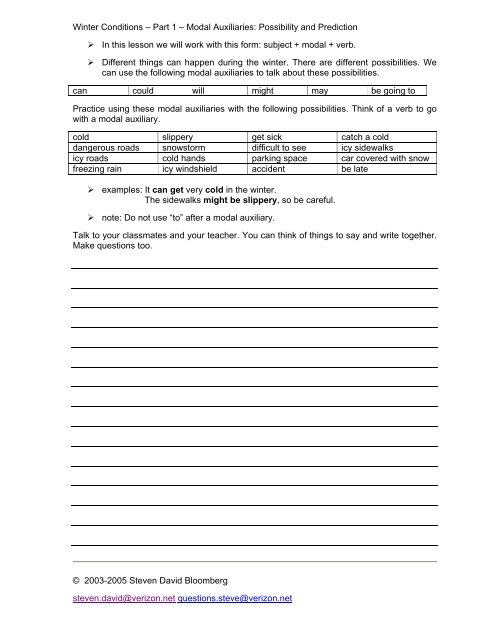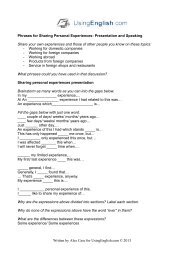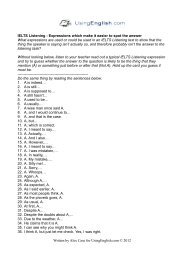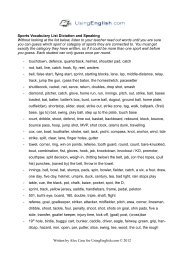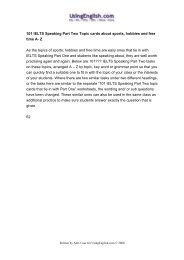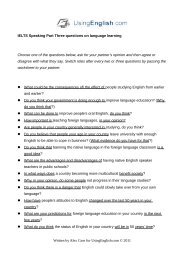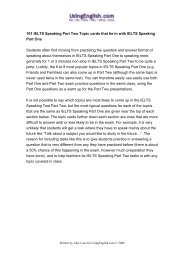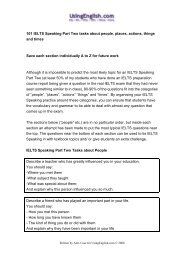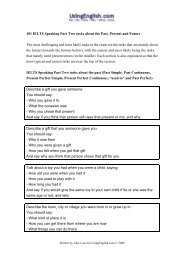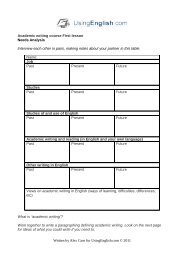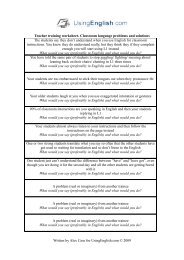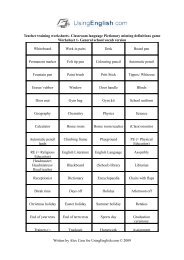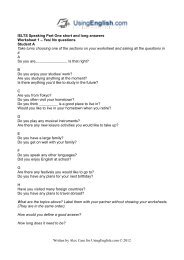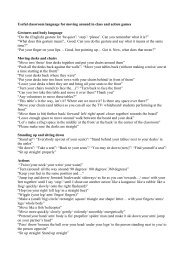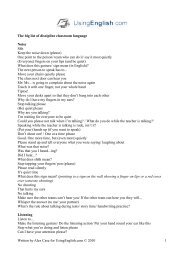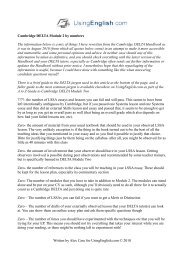Winter Conditions and Modal Auxiliaries
Winter Conditions and Modal Auxiliaries
Winter Conditions and Modal Auxiliaries
Create successful ePaper yourself
Turn your PDF publications into a flip-book with our unique Google optimized e-Paper software.
<strong>Winter</strong> <strong>Conditions</strong> – Part 1 – <strong>Modal</strong> <strong>Auxiliaries</strong>: Possibility <strong>and</strong> Prediction<br />
� In this lesson we will work with this form: subject + modal + verb.<br />
� Different things can happen during the winter. There are different possibilities. We<br />
can use the following modal auxiliaries to talk about these possibilities.<br />
can could will might may be going to<br />
Practice using these modal auxiliaries with the following possibilities. Think of a verb to go<br />
with a modal auxiliary.<br />
cold slippery get sick catch a cold<br />
dangerous roads snowstorm difficult to see icy sidewalks<br />
icy roads cold h<strong>and</strong>s parking space car covered with snow<br />
freezing rain icy windshield accident be late<br />
� examples: It can get very cold in the winter.<br />
The sidewalks might be slippery, so be careful.<br />
� note: Do not use “to” after a modal auxiliary.<br />
Talk to your classmates <strong>and</strong> your teacher. You can think of things to say <strong>and</strong> write together.<br />
Make questions too.<br />
© 2003-2005 Steven David Bloomberg<br />
steven.david@verizon.net questions.steve@verizon.net
<strong>Winter</strong> <strong>Conditions</strong> – Part 2 – <strong>Modal</strong> <strong>Auxiliaries</strong>: Good Ideas <strong>and</strong> Bad Ideas<br />
� In this lesson we will work with this form: subject + modal + verb.<br />
� There are some things we can do during the winter that are good ideas, <strong>and</strong> there<br />
are some things that are bad ideas. We can use modal auxiliaries to talk about this.<br />
1. We can use “should” <strong>and</strong> “ought to” to say what we think is a good idea during the<br />
winter. If we want our words to sound stronger, we can use “had better”.<br />
A. should, ought to = a good idea, advisable<br />
B. had better = strong advice or a warning<br />
� note: It is more common to use “should”. There are times when we use “ought to”,<br />
but “should” is more common.<br />
2. We can use “shouldn’t”, “should not”, “mustn’t”, <strong>and</strong> “must not” to say what we think<br />
is a bad idea during the winter. If we want our words to sound stronger, we can use “had<br />
better not”.<br />
A. shouldn’t, should not = a bad idea – not a good idea – not advisable<br />
B. mustn’t, must not – can mean not a good idea <strong>and</strong> not advisable – Don’t do it.<br />
C. mustn’t, must not – can also indicate prohibition – You are not allowed to do it.<br />
� prohibition = not permitted to do something – not allowed to do something<br />
D. had better not – indicates strong advice or a warning<br />
3. We can use “have to”, “has to”, “have got to”, “has got to”, <strong>and</strong> “must” to say what we<br />
think or believe we are required to do during the winter.<br />
� If you think or believe something is required, then you think it’s a good idea.<br />
� note: People often use contractions.<br />
� I’ve got to, you’ve got to, he’s got to, she’s got to<br />
� we’ve got to, you’ve got to, they’ve got to<br />
4. We can use, “do not have to”, <strong>and</strong> “does not have to” to say what we think or believe<br />
we are not required to do during the winter.<br />
� If you think or believe something is not required, then you think it’s a bad idea.<br />
� note: People often use contractions.<br />
� I don’t have to, you don’t have to, he doesn’t have to, she doesn’t have to<br />
� we don’t have to, you don’t have to, they don’t have to<br />
Think of some things that are good ideas <strong>and</strong> bad ideas for the winter. Talk to your<br />
classmates <strong>and</strong> your teacher. You can think of things to say <strong>and</strong> write together. Make<br />
questions too.<br />
� examples: You should wear a heavy jacket because it’s going to be cold today.<br />
You don’t have to drive if you think the roads are too slippery.<br />
You had better be careful. It is snowing so much that it’s difficult to see.<br />
You shouldn’t drive so fast if there’s a lot of snow on the roads.<br />
� note: “had better” – This is often reduced to ‘d better or better in everyday<br />
speaking. – You’d better be careful. You better be careful. You’d better not drive fast.<br />
� note: Do not use “to” after the following modal auxiliaries: should, must, had better.<br />
© 2003-2005 Steven David Bloomberg<br />
steven.david@verizon.net questions.steve@verizon.net


